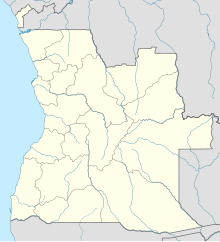This article needs to be updated. (September 2019) |
The Catoca diamond mine is the fourth largest diamond mine in the world, and is located in Angola. The mine is located on a kimberlite pipe. The mine is owned by a joint venture between the Angolan state-owned company Endiama, and the Russian company Alrosa.
 Satellite image of the mine from June 21, 2001. The light-red point in the north-east of the mine is a bush fire. | |
| Location | |
|---|---|
| Location | Saurimo |
| Province | Lunda Sul |
| Country | Angola |
| Coordinates | 09°23′56″S 020°18′03″E / 9.39889°S 20.30083°E |
| Production | |
| Products | diamonds (2.6 million carats in 2001) |
| Type | open-pit |
| Owner | |
| Company | Endiama (59 %) ALROSA (41 %) |
| Website | https://www.catoca.com/ |
Ownership
editAt one time,[when?] the mine was owned by a consortium of international mining interests, including Endiama (the state mining company of Angola) (32.8% ownership), Alrosa of Russia (32.8%), Odebrecht of Brazil (16.4%), and the Diamond Finance CY BV Group (16.8%).
In 2011, Lev Avnerovich Leviev sold LL International Holding, which held an 18% stake in Catoca to the Chinese company Sonangol International.[1][2]
In 2017, Odebrecht sold off its 16.4% stake in Catoca.[3]
In 2018, Alrosa expanded its stake to 41% ownership, with the remainder held by Endiama (41%) and the Chinese company LL International Holding (18%).[4]
In June 2022, Angola seized a stake in the nation’s biggest diamond miner, giving it majority control of Catoca. [5] The 18% stake previously held by LL International holding was nationalized.[6]
Production
editThe mine had production of 1,800,000 carats (360 kg) in 2000 and 2,600,000 carats (520 kg) in 2001. The mine's production is 35% gem quality, compared to a global average of 20%; the diamonds produced at Catoca have an average value of US$75–$100 per carat ($375–500/g). Estimated reserves are 60 million carats (12 tonnes).
The diamonds from Catoca Mining Society topped the sales of 2009, with a net profit of US$70 million, resulting from a gross production of US$122.6 million, Angop. The information is contained in an annual report from the company released in September 2011. According to the source, the sales reached 7,050,521 carats (1,410.1042 kg), at the average rate of US$62.23, a volume that represented about 78 percent of the amount sold by the diamond companies around the country. The note states that as a result of the processing of the ore, the company obtained a total of 7.5 million carats that permitted it to establish the operational cost.
In 2012 the mine extracted 6,500,000 carats (1,300 kg) out of 10 million tonnes of ore production.[7]
2021 tailings leak
editIn July 2021, waste material from the mine leaked into the nearby Tshikapa river.[8] The Democratic Republic of the Congo stated the contaminated water killed 12 people, and sickened more than 4,000.[9] After the DRC announced it would pursue monetary damages, the state-controlled miner MIBA signed a diamond mining partnership agreement with Alrosa, but did not mention the recent leak.[10]
The spill turned the river red and killed large numbers of fish, but Catoca claimed the spill did not contain heavy metals.[11] Independent testing found the presence of nickel and uranium contamination.[12] Satellite imaging collected by the European Space Agency's Sentinel-2 was able to infer the extent of the impact on water quality by observing the change in the river's color.[13] The government of the DRC initially said it would pursue unspecified monetary damages for the incident, but as of October 2022, no talks had taken place.[14]
Geology
editThe Catoca diamond deposit occurs in a kimberlite pipe.[15]
References
edit- ^ "Leviev sells Angola diamond mine stake for reported $380m profit". MINING.COM. 2011-05-31. Retrieved 2023-09-29.
- ^ "Leviev Sells 18% Stake in Angola Diamond Mine, Kommersant Says". Bloomberg.com. 2011-05-18. Retrieved 2023-09-29.
- ^ Parra-Bernal, Guillermo (2017-08-01). "Exclusive: Odebrecht agrees to sell Angola diamond mine stake - sources". Reuters. Retrieved 2023-09-29.
- ^ "Alrosa buys stake in Angola's largest diamond deposit for $70 million". MINING.COM. 2018-01-12. Retrieved 2023-09-29.
- ^ "Angola seizes stake in diamond miner". Financial Times. 2022-06-16. Retrieved 2023-04-10.
- ^ Dias, Erico (2022-10-28). "Angola president nationalises Catoca mine company, sidelining China investor". Macao News. Retrieved 2023-09-29.
- ^ McClelland, Colin (16 July 2013). "Angola's Catoca Diamond Complex to Add Mill as Miners Dig Deeper". Bloomberg.com. Bloomberg. Retrieved 2014-05-20.
- ^ "Waste from Angola's Catoca diamond mine leaked into waterways last month". Reuters. 2021-08-23. Retrieved 2023-01-22.
- ^ Hereward Holland, Helen Reid (2021-09-03). "Congo says Angola tailings pollution kills 12, to seek compensation". Reuters. Retrieved 2023-01-22.
- ^ "Russian diamond miner Alrosa boosts cooperation with Congo after Angola leak". Reuters. 2021-09-09. Retrieved 2023-09-29.
- ^ "Angola's Catoca says tailings leak contained no heavy metals". MINING.COM. 2021-10-20. Retrieved 2023-01-22.
- ^ MPULUMBA BADIAMBILE, Rémy; Musa Obadia, Paul; Useni Mutayo, Malick; et al. (2022-09-18). "Metal contaminants in river water and human urine after an episode of major pollution by mining wastes in the Kasai province of DR Congo". ISEE Conference Abstracts. 2022 (1). Environmental Health Perspectives. doi:10.1289/isee.2022.p-0872. ISSN 1078-0475. S2CID 256186452.
- ^ Désirée Ruppen (2022). Effective Monitoring Strategies for Mining-Related Water Pollution (Doctoral). ETH Zurich. doi:10.3929/ETHZ-B-000574276. hdl:20.500.11850/574276. Retrieved 2023-01-28.
- ^ Anna Majavu (2022-10-04). "The mine leak was bad. The DRC and Angola's response are no better, report says". Mongabay Environmental News. Retrieved 2023-01-28.
- ^ Pervov, V. A., Somov, S. V., Korshunov, A. V., Dulapchii, E. V., & Félix, J. T. (2011). The Catoca kimberlite pipe, Republic of Angola: A paleovolcanological model. Geology of Ore Deposits, 53(4), 295-308.
